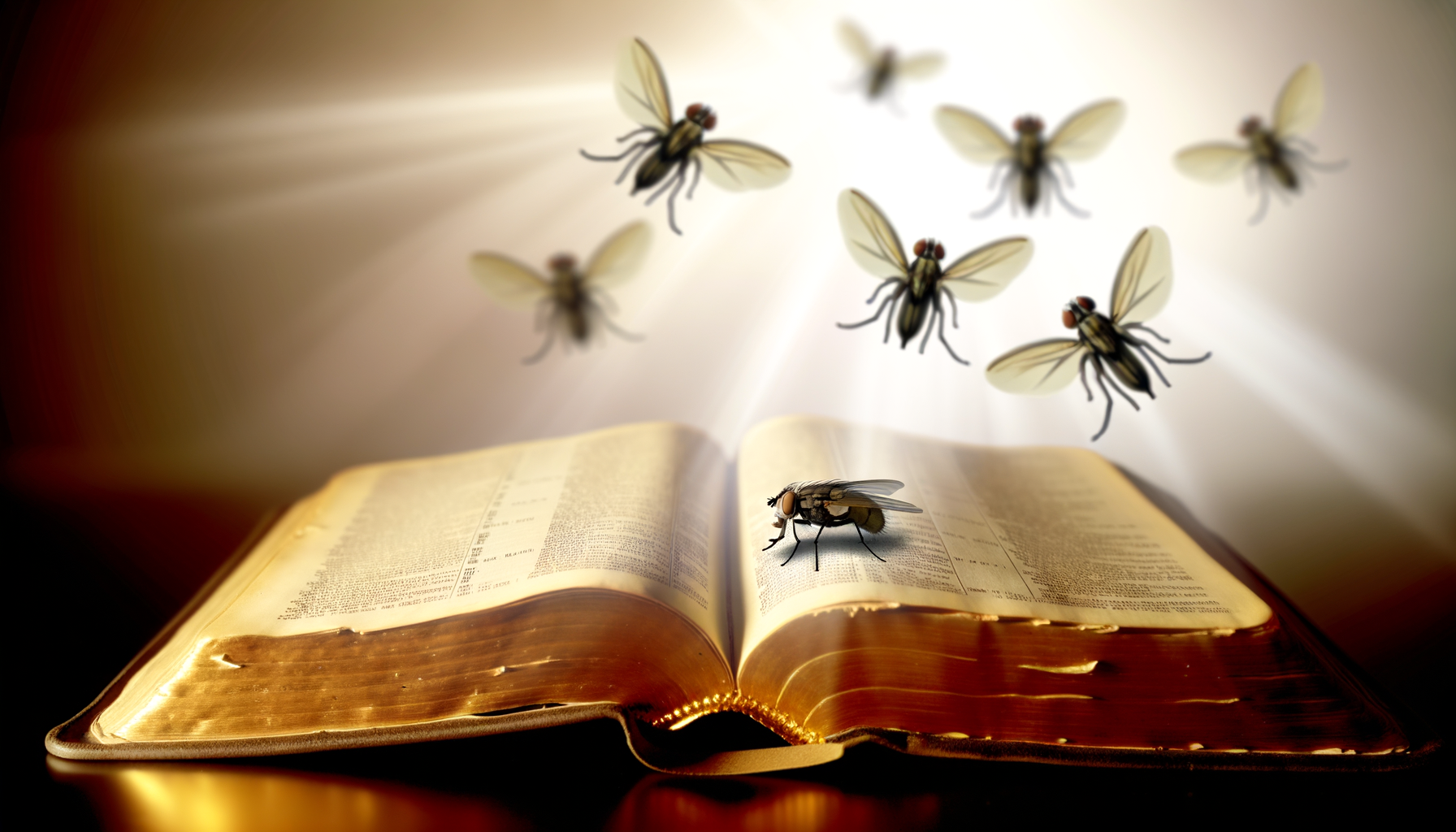When it comes to interpreting scripture, every symbol and story carries weights of significance that can often transcend the literal. So, when we explore certain recurring elements like flies, their roles can often feel perplexing. However, the prophetic meaning of flies in the Bible encompasses themes of decay, death, and also deeper glimpses into spiritual battles and judgements. This article delves into the many layers of biblical symbolism associated with flies, aiming to provide a detailed understanding that resonates with both theological scholars and everyday seekers of spiritual wisdom.
Flies in Biblical Times
The appearance of flies in ancient texts, particularly in the Bible, serves as a powerful indicator of the conditions or sentiments being depicted. Flies naturally proliferate around decay and filth, which symbolically aligns them with rot, waste, and contamination. In Exodus 8:21-31, we see the fourth plague of Egypt where swarms of flies are sent by God as a punishment. This plague is particularly telling about the nature of God’s warnings, emphasizing not only the physical discomfort but also the underlying message of decay and corruption.
Moreover, flies are seen less as individual insects but rather as swarms, highlighting the overwhelming and inescapable nature of the plagues. The sheer number of flies exacerbates the effect of the plagues, amplifying the notion of divine displeasure. The Biblical text uses these swarms to underline a sense of urgency and seriousness in God’s message, urging repentance and realignment with divine laws.
Related to this, in the Psalums, the references to flies often appear alongside mentions of disease and death. For instance, Psalm 78:45 mentions God sending swarms of flies which devour the Egyptians, aligning them with divine judgement and wrath. This juxtaposition serves to reinforce the biblical teaching that deviation from God’s commandments leads to ruin and despair, thus using the fly as a bearer of punishment and a reminder of mortality.
Symbolism and Interpretations
The interpretive journey through Biblical scriptures reveals that flies are more than mere insects within this context—they are potent symbols of decay, destruction, and the consequences of sin. The prophetic significance of flies in the Bible extends to their association with evil and impurity. In the spiritual realm, flies could represent demonic presence or moral corruption. In Ecclesiastes 10:1, it is said, “Dead flies make the perfumer’s ointment give off a stench; so a little folly outweighs wisdom and honor.” This verse symbolically implies that even a small amount of folly or sin (represented by flies) can spoil wisdom and dignity.
This symbolism is vivid and impactful, providing a stark caution against the dangers of moral decay. Flies in the Bible are thus often used to provoke a visceral, almost instinctual reaction meant to drive a deeper spiritual acknowledgment and realignment with godly principles.
The representation of flies as embodiments of corruption also mirrors their physical attributes and behaviors. Being drawn to decay and thriving in unclean environments, flies are apt symbols for sin which festers when left unaddressed. This powerful imagery not only reflects the physical filthiness associated with flies but also the spiritual contamination that can emerge from sins.
Implications in Prophetic Narratives

In prophetic narratives, flies often emerge as instruments in conveying divine messages or judgments. These narratives provide a framework through which the role of flies can be understood beyond their immediate annoyance. For instance, in the Books of Kings and Chronicles, prophetic figures like Elijah and Elisha deal with issues of corruption and idolatry, themes closely tied to the symbolic nature of flies.
Prophets in the Bible use the presence of flies to signify the onset of divine retribution for sins. Their appearance comes as a warning to repent and cleanse, thus restoring moral and spiritual order. Through these narratives, flies become a divine tool, used by prophets to visually and symbolically highlight the seriousness of the sinful conditions they are confronting.
These prophetic interpretations of flies also emphasize the duality of God’s nature as both a loving creator and a strict judge. Flies, in this sense, remind believers of the consequences that come with straying from divine paths and the inevitable judgement that follows unrepentance.
New Testament References and Theological Perspectives
Although lesser mentioned in the New Testament, the understanding of flies as symbols of decay and corruption carries into the teachings of Jesus and the apostolic writings. In the parables and teachings of Jesus, there are nuanced references to cleanliness, purity, and the avoidance of corruption, which can be indirectly connected to the symbolic essence of flies seen in the Old Testament.
Theological interpretations have often utilized the imagery of flies to discuss concepts of sin, redemption, and spiritual cleanliness. For example, in theological debates, the persistence of flies can be likened to the persistent nature of sin in a believer’s life. Just as it requires effort and intent to keep an environment clean and free from flies, spiritual life requires vigilance and continuous devotion to remain pure and pleasing to God.
Additionally, flies can be seen as a metaphor for the spread of unhealthy doctrines or heresies within the church. Just like flies, these doctrines can infest and corrupt if not addressed timely and effectively. This application of the fly’s symbolism helps bridge Old Testament teachings with New Testament challenges, providing a comprehensive view of their spiritual significance across the scriptures.
Skimming High Priority Information
In a nutshell, the prophetic meaning of flies in the Bible extends across Old and New Testaments, encapsulating themes of judgement, sin, and the need for spiritual vigilance. They symbolize the undesirable yet inevitable consequences of moral and spiritual decay. This symbolism serves as a stark reminder of the importance of maintaining purity both in thought and deed, aligning with divine will to avoid the spiritual decay illustrated so vividly by the presence of flies.
In Modern Interpretation and Application
Today’s theological discussions and sermons sometimes incorporate the symbolism of flies to address contemporary issues related to spiritual decay and moral corruption. Modern believers can draw parallels between the biblical significances of flies and the everyday temptations and corruptions faced. The message remains relevant and insightful, urging continuous self-evaluation and alignment with biblical teachings.
Furthermore, understanding the implications of flies in biblical terms provides a richer frame of reference for interpreting other biblical symbols and stories. It enhances one’s comprehension of scripture and deepens the spiritual reflection necessary for a meaningful Christian life.
In sermons and Bible study sessions, the discussion around flies can provoke thoughtful discussion about personal and communal spiritual health and the pervasive nature of sin. Just as flies can easily invade and corrupt, so too can undesirable traits and habits seep into our lives if left unchecked.
Conclusion
The prophetic meaning of flies in the Bible offers rich symbolism and powerful insights into the themes of sin, decay, and divine judgement. While the presence of flies might initially seem like a minor detail in the vast narratives of the scriptures, a deeper exploration reveals their significant role in conveying spiritual lessons. These lessons remind believers of the constant vigilance needed to maintain purity in their spiritual journey, symbolizing the ever-present danger of moral and spiritual decay.
Frequently Asked Questions (FAQs)
-
What does the plague of flies symbolize in Exodus?
The plague of flies in Exodus symbolizes divine judgement and is a punitive response to Pharaoh’s stubbornness and the Egyptians’ idolatry. It emphasizes the corruption and decay associated with turning away from God. -
Can flies have a positive meaning in the Bible?
While predominantly negative, the occurrence of flies can also lead to positive outcomes, such as strengthened resolve and renewed vigilance in spiritual practices among believers. -
Are there specific verses that can be used to combat spiritual ‘flies’ in one’s life?
Verses such as Psalm 91, which speaks to God’s protection and deliverance, can be spiritually invoked to ward off the ‘flies’ of sin and temptation.
-
How can Christians today relate to the biblical symbolism of flies?
Christians today can relate by understanding the flies as symbols of anything that corrupts or defiles their spiritual walk—such as sin, negative influences, or immoral habits—and actively working to remove these from their lives. -
Is there a particular way to teach children about the prophetic meaning of flies in the Bible?
Teaching children about the prophetic meaning of flies can focus on the importance of cleanliness—both physical and spiritual. Simple lessons on keeping their hearts and minds pure can be effectively taught using this relatable symbol.



